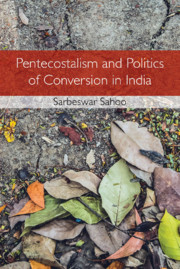Book contents
- Frontmatter
- Contents
- Foreword
- Preface
- Abbreviations
- 1 Introduction: Conversion and the Shifting Discourse of Violence
- 2 Spreading Like Fire: The Growth of Pentecostalism among Tribals
- 3 Taking Refuge in Christ: Four Narratives on Religious Conversion
- 4 Becoming Believers: Adivasi Women and the Pentecostal Church
- 5 Seen as the Alien: Hindutva Politics and Anti-Christian Violence
- 6 Conclusion: Beyond the Competing Projects of Conversion
- Endnotes
- Bibliography
- Index
3 - Taking Refuge in Christ: Four Narratives on Religious Conversion
Published online by Cambridge University Press: 05 April 2018
- Frontmatter
- Contents
- Foreword
- Preface
- Abbreviations
- 1 Introduction: Conversion and the Shifting Discourse of Violence
- 2 Spreading Like Fire: The Growth of Pentecostalism among Tribals
- 3 Taking Refuge in Christ: Four Narratives on Religious Conversion
- 4 Becoming Believers: Adivasi Women and the Pentecostal Church
- 5 Seen as the Alien: Hindutva Politics and Anti-Christian Violence
- 6 Conclusion: Beyond the Competing Projects of Conversion
- Endnotes
- Bibliography
- Index
Summary
On 19 February 1981, Meenakshipuram village in Tirunelveli district of Tamil Nadu hit the national headlines. The Dalits of Meenakshipuram converted to Islam on a mass scale and renamed their village Rahmatnagar (Wright Jr, 2007: 239). Newspapers ran headlines like ‘A whole village goes Islamic’. The Indian Express reported, ‘180 harijan [low caste] families have changed their faith. Nearly 1,000 persons have shifted their loyalty to Islam’. Although there have been many explanations regarding the motive of this conversion, one dominant explanation is that the Dalits were motivated by the desire to achieve dignity and equality. The Dalits of Meenakshipuram had strived for equality of status with the higherranked Thevar caste of the village, but the Thevars had ill-treated and socially boycotted them. When tension between the two communities intensified with the murder of two Thevars in nearby Mekkarai village, Dalits were immediately suspected of being involved; and the police came down heavily on the entire community, detaining some of them for nearly a month. Agitated over the attitude of the police and to gain status, the Dalits of Meenakshipuram turned to Islam.
Like the Meenakshipuram story, conversions of Dalits and adivasis to other religions have most often been justified as an escape from the oppressive caste order. However, Hindu nationalists have severely opposed the conversion of Dalits and adivasis. For example, flyers of Hindu nationalists groups such as the RSS and the VHP proclaim that ‘India is a country of Hindus. … Our religion of Rama and Krishna is pious. To convert [or] leave it is a sin’ (Human Rights Watch, 1999). Another flyer warns, ‘Caution Hindus! Beware of inhuman deeds of Muslims. … Muslims are destroying Hindu Community by slaughter houses, slaughtering cows, making Hindu girls elope. Crime, drugs, terrorism are Muslim's empire’ (Human Rights Watch, 1999).
Hindu nationalists have also severely resisted Christian missionary activities in adivasi-dominated regions of India, leading to clashes between the Hindu and Christian communities, violence and bloodshed. As discussed in Chapter 1, several reports and data sources suggest that attacks against Christian minorities throughout the country increased significantly in the 1990s which forced Prime Minister A. B. Vajpayee to call for a ‘national debate on conversion’ in January 1999 (Kim, 2005: 225; Sengupta, 2015: 345).
- Type
- Chapter
- Information
- Pentecostalism and Politics of Conversion in India , pp. 49 - 86Publisher: Cambridge University PressPrint publication year: 2018



